#wonderfully done
Text
Into the Wilds is one of my favorite specials, so I decided to make a little collection of some favorite moments. I was sad that we never got back to these characters, but I will still always imagine them wandering around in the background of the main campaign because I can.
#rusty quill#rqg#rusty quill gaming#into the wilds#alexander j newall#ben meredith#helen gould#bryn monroe#I love this one so much#its so delightful#and i love how with no prep alex just went weird#but also love that with the knowledge of the rest of rqg#it started to make a WHOLE LOT more sense#*chef kiss*#wonderfully done
13 notes
·
View notes
Text
Tom wins everybody loses
1 note
·
View note
Text
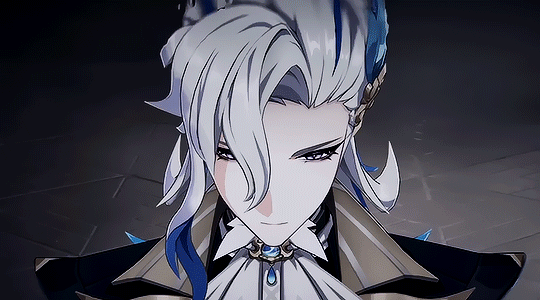
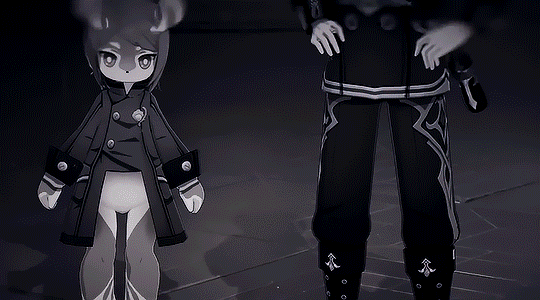
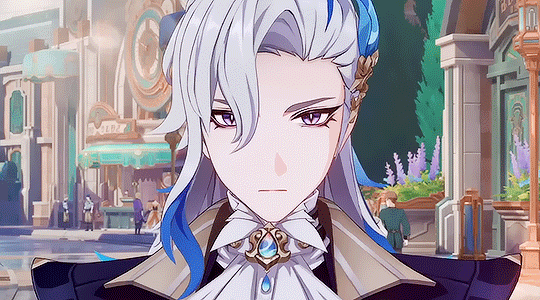
"the rainy season's almost over! the skies are supposed to clear in a few days."
"i hope you find time to enjoy the sunny days ahead."
#genshin impact#genshinedit#genshinimpactedit#genshinet#genshin spoilers#4.1 spoilers#story quest spoilers#neuvillette#mine*#neuvillette*#I CRIEDDDDD#NEUVILLETTE I LOVE UUUUUU#when they paralleled the positions of neuvi's old friends with paimon and traveller oh it BROKE ME#this quest was so wonderfully done....... god i don't think i'll get over this for a while i could talk about it forever#i swear im turning into a neuvillette-only blog at the rate of how im giffing him I PROMISE I GIF OTHER CHARACTERSKJDHS
642 notes
·
View notes
Text
it’s so deeply important to me that achi was the one to initiate their first kiss
karan wants to kiss achi. he wants it so so badly, but he holds himself back because he doesn’t want to make achi uncomfortable. he’s been that close to him before, and watched him shrink back or go quiet and withdraw. no matter how badly karan wants to kiss him, he won’t do it until he knows achi is comfortable.
but achi sees karan looking at his lips, he sees the want in karan’s eyes. and we can see him realise ‘oh, he wants to kiss me’. and it’s perhaps the first time in his life he’s felt desired like that.
but we also see achi look at karan’s lips in return, and it’s also the first time in his life that he’s wanted to kiss someone. so he does.
karan holds so so still, but achi keeps moving closer, until he kisses him, and he’s so confident that this is something they both want.
and when achi pulls away smiling, karan’s face is so openly awestruck that the man he’s been in love with for so long truly does want him in return.
#let’s go achi!!!#embrace yourself and these feelings you’re having!!!!#cherry magic thailand#cherry magic th#karanachi#it just felt so so right and was wonderfully done
188 notes
·
View notes
Text
genuinely fucking embarrassing for aaron kuder as well as everyone who looked over the art and approved it to have continuously drawn the incorrect cane for matt. like honestly shameful as an artist. you couldn't do your basic research task on a white cane? to ensure you were drawing the correct aid for matt to use? it's further embarrassing when in issues four and five matt does have one because germán peralta and farid karami, you know, did their basic job as artists of making sure matt had the correct cane. if nothing else look at any comic from recent time and you would know matt has a white cane. this isn't the 1960s. this is not difficult. this is highly shameful on kuder's end and im not going to be nice and just say it's disappointing. i find it correct to call it embarrassing and frustrating. it is your basic task as an artist to research your references for character props. if you can make sure your cars and apartment buildings and costumes are correct you can take five seconds to make sure this is correct too. if you can draw matt's billy club correct you can draw this correct too. there is no excuse.
#static.soundz#like when it is only kuder working on the art it is like this. i skimmed through to make sure i wasnt being stupid.#and bc those other two issues he had the white can i cant find it in myself to believe there is a good intentional reason for this#and if there is. well it better be damn fucking good. bc i dont get it.#especially considering we have had rivera's wonderfully done cane as billy club for matt. like we know how to work all these things together#and if you want them as separate items well again. not fucking haaard. so i really see no good reason for this#outside of a pure intentional ignorance.
68 notes
·
View notes
Photo


Study of a frame from “One Way Out” - eVERYONE GO WATCH ANDOR IT’S SO VERY GOOD
The writing! The acting! The visual world building!!! The scoring choices!!!! AAAHHH
#andor#star wars andor#cassian andor#star wars#fanart#andor series#my scribbles#look I was dubious about another star wars show#tbh I haven't particularly enjoyed most of the others#and it took me an ep or so to get into it bUT#I'M NOW SO FULLY INVESTED#it's genuinely extremely well-done there's so much to consider and unpack and analyze#just a wonderfully cinematic tv experience#DO IT GO WATCH IT GO GO GO#also I'm really proud of this study actually#I feel like I'm getting closer to the style of rendering that I love looking at
651 notes
·
View notes
Photo

the amazing and talented @lamatisse let me test out her upcoming occult skintones and i gotta say....they’re gorgeous ♥💌
Update: Llomeia is now up for grabs! Enjoy 🥰
CC list: skintone, hair, earrings, necklace, romper, boots
download (sfs, cc not listed is included), tou is to please be normal
#s4cc#ts4cc#ts4#z#SO well done like i'm in awe#the highlighting on the skin is wonderfully detailed and there are 0 artifacts - you did an amazing job ;-;#thank you for letting me test them out!!
1K notes
·
View notes
Text

This piece of @tuvok-enjoyer's wherein Tuvok is wearing an earring with four ornaments (one for each child) captivated me - I really love the idea of that!
#Tuvok#fanart#st voyager#st voy#star trek voyager#it also made me imagine Tuvok not being able to wear the earring bc he wasn't wearing it undercover and then they all got zapped....#SAD!!!!#bea art tag#Highly recommend you go check out tuvok-enjoyer's original piece - wonderfully done AND he's wearing nail polish~!!#right after you survive the desert you have to get your ear pierced#fortunately after surviving the desert it's not gonna really matter much to you
34 notes
·
View notes
Text
A Fight Taken To Heart: How Edward Teach Became a Queer Ally in Honor of Charles Vane
This piece was originally written for the fantastic @blacksailszine, which unfathomably came out over a year ago (and you should check it out if you haven't!). Somehow, I managed to procrastinate posting this here for that long, which is asinine. Especially because I'm actually very proud of it!!!
The news about Ray Stevenson today has me emotional (of course) and thinking again about how his performance as Blackbeard had a great impact on me. In his honor, it feels like a fitting day to finally share my tribute to his character on this blog.
Without further ado... please enjoy my meta below 🖤
--------------
The first time we see Edward Teach’s eyes, they’re framed in a mirror with a heart carved above it. Within the context of a scene designed to convey that Teach is a figure who commands fear and respect, this seems to be a curious choice for an introductory shot. Yet, much like many details placed throughout Black Sails’ meticulous narrative, the mirror’s design is poetic in hindsight because Teach’s heart was his ultimate motivation.
Over the course of multiple scenes, the first half of season 3 introduces us to both the pillars of who Teach is as a character and the primary characteristics of his relationship with Charles Vane. Taken as a whole, the picture painted of Teach’s presence in the story is that he acts as a metaphor for heterosexuality, toxic masculinity, and tradition. We learn that Teach had nine wives over the course of eight years, at least partially because he is motivated by the desire for a son. He glorifies strength above weakness, and he defines strength as superior physicality, independence, and sufficient leadership. He reminisces about the original state of Nassau in his youth, in which the standard was an enforced masculinity, powered by the notion that “one had to prove his worth.” And as he says to Vane and Jack in 3x02, in his view,
“You have taken away the one thing that made Nassau what it was. You have given her prosperity. Strife is good. Strife makes a man strong.”
Upon his introduction, Teach sees only the small picture of Nassau, not its place in the bigger picture of the world. He looks upon a Nassau rich in monetary plunder, preparing to come to its own defense or go to war, and he sees the ease in which men can typically join any crew as a marker of a lack of conflict. What he fails to take into account is that the primary strife now originates externally rather than internally because it is the strife of oppression, and that the solidarity that results from that strife creates its own version of strength.
”Why are you so determined to defend Nassau?” he asks Vane in 3x02, because the island is no longer anything special to him. “A lion keeps no den,” he tells Vane in 3x05, “Because the savanna, all the space within it. . . belongs to him.” Teach is not beholden to Nassau for haven or home, because he was able to assimilate into civilization whenever he had cause or desire. He married multiple women, flew under the British flag, and even spoke their “language” of flag codes (3x10). While Teach is certainly a pirate, it is by choice rather than survival.
As a result, he cannot understand the importance of true solidarity amongst the oppressed–and thus, Nassau’s defense–because he’s never needed it, as a straight white man who’s never been limited by oppression. And because this is a narrative where piracy is arguably a metaphor for queerness, filled with characters who do not have the luxury or desire to play by civilization’s rules, Teach sticks out upon his entrance. It’s also partially why he’s initially framed in an antagonistic light; he is not “with them,” and therefore, he is “against them” by default in some capacity.
The exception, of course, is his bond with Vane. Teach is one of many characters motivated by the desire to leave a legacy; as he says in 3x03, “There is an instinct to leave behind something made in one’s own image.” In his case, this manifests as his desire for a son–but he saw parenthood as an opportunity to mold and form another man to be his reflection. Teach wanted Vane to be a copy of him, but Vane never was, and it’s the primary source of the conflicts between them.
Teach had no love lost for Nassau, and so he calls it a “burden” on Vane, while Vane insists that he is “committed to it” and Jack by extension (3x03). Teach scoffs at the idea of such loyalty, deriding and discounting Vane and Jack’s relationship, casting aspersions on Jack’s character in the process–even as Teach demands to receive such loyalty from Vane himself. It’s evident that Teach doesn’t understand core aspects of Vane’s personality and motivations, but Vane is unequipped to explain himself to him.
This is partially because Vane initially doesn’t understand his own motivations either, especially in the face of his father figure’s disapproval. His inner struggle is exemplified in how he’s torn between allegiance to Teach, or allegiance to the rebellion for Nassau’s independence and his people caught in the fight. Flint summarizes Vane’s internal conflict by bringing it to light for him in 3x06:
“They took my home. I can’t walk away from that. Can you? Forget me, forget Teach, forget loyalty, compacts, honor, debts, all of it. The only question that matters is this: Who are you?”
It is not insignificant that a gay man says this to Vane. The struggle of finding oneself is inherently queer as a framing device, especially in the context of a narrative where piracy and freedom are pursued by the marginalized. The fact that wrestling with identity is the defining point in Vane’s arc implies that the answer exists beyond the bounds of what others would ascribe to him. Straight people–particularly in regards to Black Sails’ main cast of characters–are not faced with this question.
And various players do try to ascribe an identity to him. Teach tells Vane that he’s a lion, while the Spanish soldier calls Vane a fellow sheep (3x05); Eleanor lists Vane as the antithesis to civilization (3x01) and calls him an “animal” to his face (3x09). Yet even up to his end, though civilization and history would paint him differently, Vane’s motivations were always painfully human. Vane was driven by emotions on a deeper level than most recognized, and by desire for two primary things: freedom and honest loyalty.
Vane felt empathy for the unfree, and he was defined by wanting to avoid living in chains again at all costs–literally or metaphorically. He explicitly compared the fear that slaves face to the wider struggle of the pirates on Nassau (3x01), and the fear they feel as they sit on “Spain’s gold on England’s island,” expecting a retaliatory response. Vane feared subjugation or submission at the hands of any person or power, considering it a fate worse than death; to him, “no measure of comfort [was] worth that price” (3x08). His manifesto was “side with me. . . and we’ll keep our freedom,” and he said he was “[a man] who would die before being another man’s slave again” (2x06), which became his ultimate fate.
Pursuing freedom defined both Vane’s life and death, but it was not an abstract concept. It was freedom to a purpose: freedom from expectation; to make his own choices; to define home as he saw fit; and, crucially, to surround himself with honest people who provided mutual loyalty and respect without subterfuge or manipulation. This is why Jack, who knew him best and cared for him most, called Vane a “good man” and summarized him this way in 4x07:
“He was the bravest man I ever knew. Not without fear, just unwilling to let it diminish him. And loyal to a fault. And in a world where honesty is so regularly and casually disregarded…”
Vane exhibited and sought both honesty and loyalty. It was also how he expressed his love, and the way he wanted love to be expressed to him in return. That is partially why Eleanor so effectively acted as his downfall: he repeatedly trusted her, but she could not or would not be loyal to him. By contrast, as he told Teach in 3x02, Vane found loyalty and commitment in Jack–and in Anne by extension.
So while “a lion keeps no den,” as Teach said, what a lion does keep is a pride. A lion may be free to roam, but it does so with a family. Teach did not begin to understand the significance of that to Vane until after Vane gave his life not only in the name of freedom, but also in defense of his family and home.
This turns Teach’s earlier question of “Why are you determined to defend Nassau?” into the unspoken question of Why did Charles Vane willingly die to defend Nassau and those who are fighting for it?
When Teach called Nassau–and, to some extent, Vane’s partnership with Jack–a “burden,” Vane tried to explain to him that wasn’t the case. At the time, Teach didn’t listen. He gave Vane an ultimatum: I’ll help protect these people, but you have to leave them, their cause, and your “commitment” behind.
Teach thought leaving all of that behind was freedom, and it was a definition of freedom he thought that he and Vane shared, referring to the two of them as being “of the same mind” (3x05). But Vane was unable to leave his people or their fight behind, because that’s not what freedom meant to him. For Teach, freedom meant solitary independence; for Vane, freedom came to mean solidarity (3x09):
“Because they know that my voice, a voice that refuses to be enslaved, once lived in you. And may yet still. They brought me here today to show you death and use it to frighten you into ignoring that voice. But know this. We are many. They are few. To fear death is a choice. And they can't hang us all.”
After Vane’s death, Teach listens. In the absence of being able to listen to Vane directly, he does the next best thing: he goes to the people Vane valued most and died to protect. In the name of the mutual interest of revenge, he listens to Vane’s family.
At first, Teach obviously thinks Jack and Anne are both weird–to use a different word, he thinks they’re both queer–and he makes that clear in underhanded comments. Neither Jack nor Anne fit into the boxes of “man” or “woman” in the traditional senses that Teach is most accustomed to valuing. He doesn’t understand why Vane would align with them and their cause above all else, or why Vane would be loyal to them and value their unconditional loyalty in return. But Teach seemingly knows that if he can get to know them, then perhaps he can understand what Vane saw in them, and–in turn–learn more about Vane as well. Vane lives on in pieces of them, and so it is upon listening to them that Teach ends up indirectly listening to Vane one last time.
In a discussion spurred by Anne’s concerns, Jack and Teach debate the merits of murdering Eleanor Guthrie or chasing Woodes Rogers, and they bond over their shared understanding and memory of Vane’s “distrust of sentimentality” (4x02). They can chase an empty version of revenge in the name of justice, fueled by emotion... or they can fight to win the war of resistance that Vane gave his life to incite. Between the two of them and their shared grief, and in an echo of Vane’s internalized arc, they find that the only question that matters is this: Who was Vane, and what mattered to him most? They both discover they already know the answer.
For Teach, acknowledging that answer involves fully accepting that Jack and Anne were the family that Vane chose, that the rebellion for Nassau’s freedom was personal enough to Vane that he died for it, and that this is a fight which holds value and necessity that Teach initially misunderstood.
Teach is straight, and his views on masculinity are not fully incompatible with the ones civilization enforces. Oppressive powers hold no true threat for him, because he is capable of assimilation; he could leave Nassau and thus the rebellion for its freedom behind. He always planned to. But after the sacrifice of the man he considered a son, he chooses to become an ally in the fight against white supremacy, and an explicit supporter of Jack and Anne–the queer found family that Vane prioritized, and died to protect.
Teach always thought he was molding Vane into his own image, but the reverse became oddly true instead: Teach allies with the cause, gives his life for it, and indirectly protects Jack and Anne with his final moments, echoing and honoring Vane’s sacrifice.
Woodes Rogers expected to keelhaul Teach into submission by default, through torture no man should have been able to repeatedly survive. But to fear death–to submit to death on anything other than one’s own terms–is a choice. A pirate’s fear is an opponent’s victory; Vane and Teach both knew that, and embodied it. Teach’s unwillingness to let fear diminish him or to be broken by Rogers was largely the result of his own principles and hard-won defiance, but it was also the only reason Jack and Anne narrowly avoided the same fate.
It aligns poetically: in the final months of his life, Teach’s actions were motivated by old shifting shrapnel lodged in his chest and the beating of his heart, which he referred to as “a grim little timepiece” (3x06). And “the louder that clock [ticked]”–the more the shrapnel moved, and the closer his end became–the more inclined he was to pursue happiness and purpose (3x01).
Ultimately, he was keelhauled 3 times, and then he was shot.
For Charles–tick.
For Jack–tick.
For Anne–tick.
And for Nassau–
Boom.
How fitting.
After all, Edward Teach always expected that his heart would bring about his end.
--------------
If you'd like to read more of my meta about this show, here are the other pieces I've written:
• Black Sails, Queer Representation, and the Valid Canonicity of Subtext
(I should crosspost that to tumblr at some point ^)
• The Flinthamilton Reunion Is Definitely Real
• James Flint Is Gay
And my pinned post on Twitter @/gaypiracy has a collection of the shorter posts / writing I inadvisably did on there.
Don't forget to check out the Black Sails Zine for a variety of incredible work :)
#black sails meta#edward teach#blackbeard#charles vane#black sails#edward teach meta#this is mostly going to get seen and scrolled past by people who are into that Other Show now isn't it? probably lol#vanerackham#what on earth is the trio's quasi ship name?#vanerackhambonny#fuck it I don't know#charles vane meta#my meta#okay I'm done. but in all seriousness I'm still very proud of this piece of writing!!!!#thank you to Ray Stevenson for all that he gave us by playing Teach with such gravitas and depth. RIP to a wonderfully talented man
120 notes
·
View notes
Text
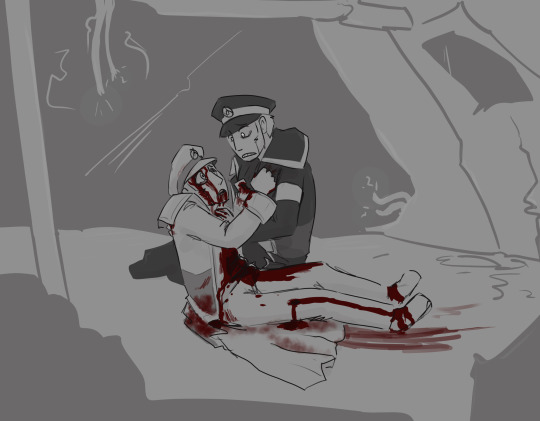
Whumptober day 21: Coughing up blood
“They are not dead. They are not dead. Right? They cannot be dead. I did not kill them. I did not tell the joltiks to kill them!” After speaking so much, Emmet could not catch his breath and he clutched at Ingo’s coat lapels, eyes pleading with the man as he coughed weakly.
from THE fic ever, The Good In Me by @ingo-ingoing-ingone
VERY painful but in probably the BEST way imaginable. it hurts me but it feels so so good. it's written so SO very well.
anyway. i CANNOT BELIEVE i forgot to post this earlier 🤦
#whumptober2022#coughing up blood#blood#crash#train wreck#pokemon#submas#ingo#emmet#recs#no.21#words cannot express how WONDERFULLY DONE all of the emotions are in that fic. it hurts so SO BAD. /BECAUSE/ of how well its written#just. absolutely. so good so good#injury
210 notes
·
View notes
Text

#hot dangerous and wonderfully bisexual. thanl you google translate#sorry shit ton of caelius posts werescheduled for tonight .. im done now :)#i need to make a caelius tag
13 notes
·
View notes
Text

A shitpostier version of this interaction:

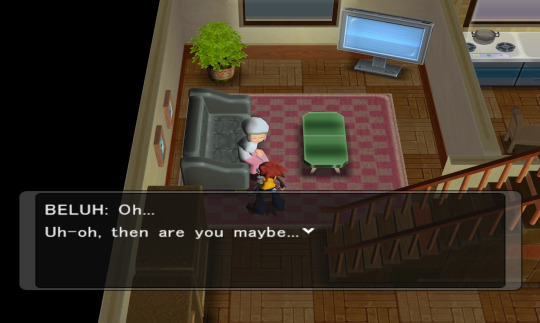
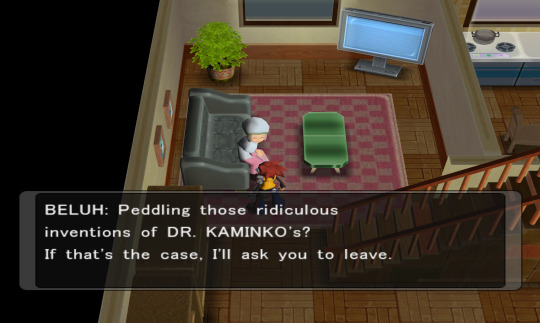
#the doodle was cutout of a larger shared aggio canvas#also this YES/NO option is so wonderfully unnecessary (/pos)#the devs could have just had Beluh say “oh you must be Michael Lily sent word of you" and be done with it#but instead it adds to the delicious lore of Kaminko's inventions#these come up fairly often throughout the game both during story beats and going out of your way to talk to NPCs at various points#really makes the whole region feel connected when townsfolk far away from each other have similar experiences being scammed by this guy#I also think it shows that Michael has two sides to his personality:#sweet angel cinnamon roll too pure for this world#and your typical sassy teen#he's hit his rebellious and sarcastic phase lol#he's usually a terrible liar though#most adults can see through his attempts anyway#i guess he's only able to dupe the very young and the elderly#micaehl you little shit#i love him#pokemon XD#Orre
35 notes
·
View notes
Text
Ghosts series 4 episode 4, Gone Gone


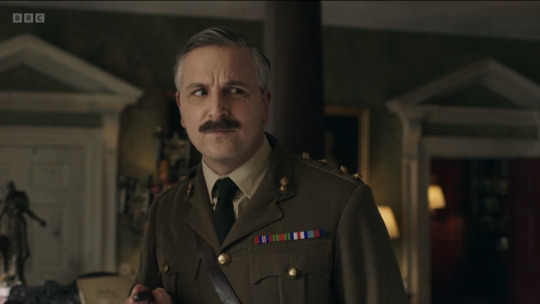


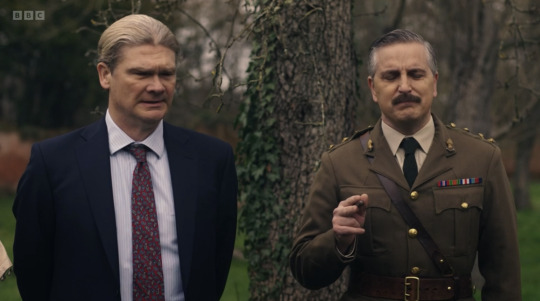




Well that was quite beautiful Mr Willbond. It always amazes me how comedies always tend to be the best shows for talking about death and grief
#bbc ghosts#ben willbond#the captain#capping the cap#bbc ghosts spoilers#one last yes please Mary#absolutely wonderfully written#still funny whilst being very moving#I’ve done the Fanny thing of calling out for someone who’s not there anymore#the moment realisation hits is heartbreaking#that little lip wobble#good to know Ben’s dad dancing is just him and not acting#finger binoculars#the whole cast were really on top form in this one#more gun noises please
304 notes
·
View notes
Text
If you want to see a reasonably OK made movie with a beautifully animated dragon voiced by Shohreh Aghdashloo, where the dragon gets her revenge in the end, we do recommend Damsel.
The dragon is not the heroine, she's definitely the creature the heroine has to survive.
And the story is about as simple and cliched as any wilderness/creature survival flick. And you'll know by the title and setup that's it's a basic overcoming misogyny flick, which, well, we need those. It's a fairy tail turned on its head.
And if you feel claustrophobic from spelunking scenes in caves, you might want to avoid it or take anxiety meds before watching it.
But, if you want to see a dragon that's objectively better than Peter Jackson and Blueberry Cobblepot's take on Smaug, watch it.
#dragon#dragons#Damsel#movie#we felt Smaug was wonderfully done#but his animation sequences were not this good#and Cumberbatch's voice is NOT as draconic and lovely as Shoreh's voice. She KNOWS how to be a dragon.#And#Also#As a character Smaug's a fuckboy#the blending of the effects with the scene were not as good as in The Hobbit of course#but they put their money into the animation and directing of the action (where it should go)
8 notes
·
View notes
Text

Vermillion
#ensemble stars#mayoi ayase#enstars#it's done !! hope you like it :D vermillion is one of my favorite alkaloid songs mayois va sings so wonderfully#and his movements in the mv are just beautiful !#the lines are not that clean cuz i went straight to coloring after the sketch !! i want to practice coloring more and more so !!#maybe in the future i'll do proper outlines#narart
99 notes
·
View notes
Text
Hello.
I just got to *THAT* Astarion cutscene in my Durge run.
I am Unwell™
#seven hells that was all wonderfully done#some of the camera angles got borked i think but i was ENTHRALLED#I'd seen bits and pieces of the scene before but I'd never seen it all at once#i am not sure I'll be able to sleep tonight#bg3#baldur's gate 3#astarion#dark urge#the dark urge#astarion x dark urge
16 notes
·
View notes